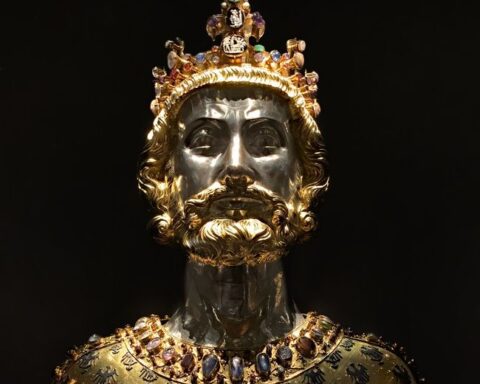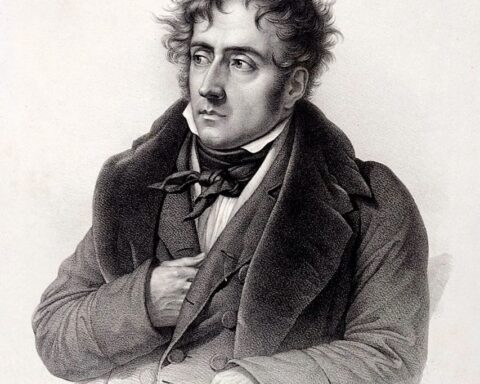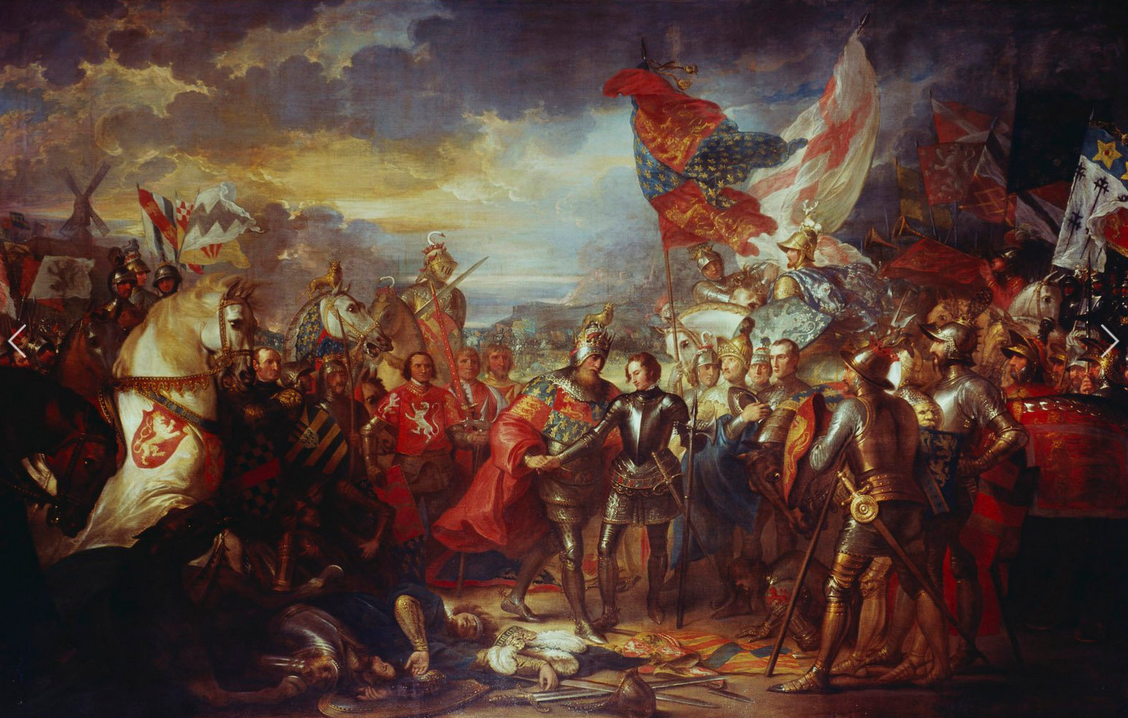The girl lay in the road, clothed only in dirt. Her tongue, caked with dust, pushed out of her mouth and her limbs lay twisted. The soles of her small feet were scraped raw.
Dawen, kneeling next to her, noticed that her pale skin was crisscrossed with half-healed welts and cuts. Those weren’t what killed her, Dawen thought; they were old wounds. Whatever stole her life had left behind no more than a frozen mask of fear and exhaustion; it hadn’t touched her, at least not in any place Dawen could see. She glanced up at the bystanders, seeking a face that showed something other than curiosity or dread. None of them seemed to recognize the girl any more than Dawen did.
Her father wrapped the girl in an old blanket. Dawen grabbed the lower half of the bundle to help him lift it, careful not to touch the body with her bare hands. She was always careful when they died violently. As she struggled with her end of the awkward burden, the blanket unraveled and a small arm swung free. Dawen’s hand shot out instinctively to catch it but pulled back in panic. Dawen felt a spark as her slender fingers touched those of the girl, then laughing mouths flashed before her eyes and heat engulfed her body. She screamed and collapsed to the ground, shaking and sobbing. The laughter faded.
She looked up and saw her father struggling with the unwieldy body. He recovered and set it softly into the wooden casket. Then he knelt in the dirt, taking both of her hands in one of his. His other hand gently pushed the hair from her face. She looked into his eyes. They were filled with concern but rimmed with guilt.
“I am sorry,” he said. “I should not have let you help with a murder victim.”
“It’s alright,” she replied, catching her breath. “I only saw a little.”
Her father helped her up and hugged her, wiping a tear from her cheek. Then he turned to the slender body on the cart. Its sunken eyes stared lifelessly past him into the cold skies above.
The undertaker placed a calloused hand on the girl’s forehead. “Two days, child, and we shall give you rest.”
“Do you think anyone will come for her?” Dawen asked.
“For a strumplet?” He shook his head. “No one will come for this one, but after tomorrow we shall bury her with the others.”
A strumplet, Dawen thought: another nameless girl who wandered to the city, hoping to escape boredom or an abusive father, looking for a way out of her miserable home. They were usually younger than Dawen’s seventeen years. Before the soldiers came, they worked as cooks or waitresses or farmhands. Now they ended up as prostitutes and, all too often, in the cemetery. Father named them and carved their wooden grave markers himself. She remembered seeing him several times, kneeling alone next to their fresh graves with his face buried in his hands. She always snuck away, waiting for him in the house, mourning by herself. His quiet voice echoed in her mind. She watched him reach for the coffin lid.
“No one will come for this one.”
Her father’s hand gently closed the eyes and smoothed out the lips, giving the strumplet a more peaceful look. Not peaceful. No, she would not have peace until she was in the ground, Dawen thought, and maybe not even then. The curious crowd dissolved as the undertaker’s horse-drawn cart carried its pine-encased burden away. Dawen’s eyes stared between the horse’s ears, but she was not watching the road: she was trying to think of a way to help the strumplets other than picking their corpses out of the street.
* * *
Dawen heard the knock at the door, followed by her mother’s quick footsteps. Fossick was early for dinner and he inhaled the aroma deeply as he entered their home. Her father’s best friend never missed their weekly supper, but even during his off hours he wore the armor of a Red Guard. Setting his helmet and sword inside the door, he kissed his hostess on the cheek.
“It smells wonderful, Jenna,” he said, “I’m still surprised your husband can fit into his pants.”
Jenna blushed and pointed him to the room where Dawen waited hungrily with her father and her brother, Pontis. Then she scuttled back to the kitchen.
“I heard you found another strumplet this morning, ‘Taker,” Fossick said, settling into his customary chair. “Same face?”
“Aye, same face,” Father nodded. “Same story as well. The soldiers did nothing but point out where she was: in the middle of the street with the dirt stamped flat all around her. Had the prints been cloven, I would swear a thousand devils held a romp over her body. But they were all hers. The child must have danced herself to death.”
“Soldiers,” scoffed Pontis. “Me and my Rats got another one two nights ago. He sure had a lot of blood in him.”
Fossick raised his hand, cutting the boy off. “You can speak freely around me,” he said. “The Red Guards don’t work with them and your father and I have been friends a long time. But you had best be careful bragging around those in armor. So far, the garrison is content to replace a soldier here and there, but if they get wind of your gang, you’ll end up deader than a strumplet. And you’ll be surprised how much blood they can take out of you before you stop begging for death.”
Dawen watched a pout cross her older brother’s face. Pontis lacked the soldier’s discipline, she knew: he was too proud, too impulsive. At least he had avoided the attention of the foreigners who routed the king’s army last year and settled into garrison duty. Dawen suspected that anonymity was probably due to the fact that her father’s profession kept the family isolated from the rest of the city. And since the soldiers buried their own dead – when they found them, which was seldom – they had discovered no reason to visit this home yet. She was glad for that.
“Your father tells me you got quite a shock today, Dawen,” Fossick said. He seemed glad to change the subject from the garrison, though this was not a subject Dawen would have chosen, were it up to her.
“Mother’s curse,” she answered playfully, exaggerating a frown at her mother who hovered over the table, scooping steaming vegetables onto each plate. “You never should have married an undertaker, Mother.” Her mother blushed but her eyes laughed at the familiar taunt. “I only touched the girl for a moment. It was too…” She swallowed hard then continued, “You know, when someone dies of old age, it’s the most peaceful feeling. But this…”
“Let us speak of something a little less morbid,” her father cut in.
“Now that’s funny,” Dawen giggled, glad the subject was about to be changed again. “Imagine a squeamish undertaker.” Mother smiled broadly at that and joined her family at the table.
Continued in Part II

Strumplets, Part I
1 Comment
Leave a Reply
Latest from Literature


Legends of Charlemagne
His fame has been enhanced and magnified through a host of ballads and romances.

Chateaubriand (Part 2)
His journey in 1806, from Paris to Greece, Constantinople, Palestine, Egypt, and Carthage.

Old Ways
Editor’s note: Originally posted by Last Redoubt at https://lastredoubt.substack.com/p/old-ways Paper has a lot of problems. It’s bulky. It catches fire. More to the point, if I want to send something on paper

Chateaubriand (Part 1)
"It was in these disastrous days that Chateaubriand arose, and bent the force of his lofty mind to restore the fallen but imperishable faith of his fathers."




5